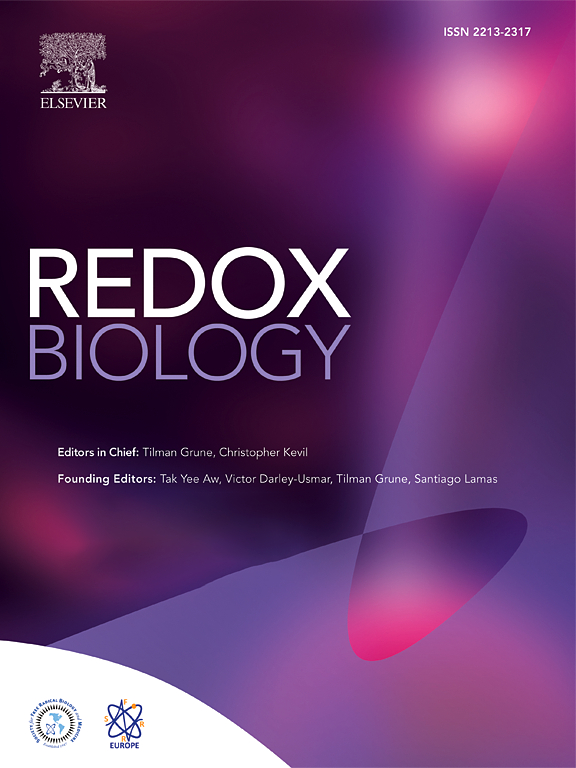Anemoside B4 alleviates ulcerative colitis by attenuating intestinal oxidative stress and NLRP3 inflammasome via activating aryl hydrocarbon receptor through remodeling the gut microbiome and metabolites
IF 11.9
1区 生物学
Q1 BIOCHEMISTRY & MOLECULAR BIOLOGY
引用次数: 0
Abstract
Ulcerative colitis (UC) is a chronic, non-specific inflammatory disease of the intestines with a significant increase in global incidence in recent years. Oxidative stress and inflammation are two hallmarks of UC pathogenesis. Anemoside B4 (AB4), a pentacyclic triterpenoid saponin, exhibits significant antioxidant and anti-inflammatory properties and shows potential for preventing UC. Here, an animal model induced by dextran sodium sulfate (DSS) was used to investigate the effect of AB4 on UC. The results demonstrated that AB4 significantly reduces intestinal oxidative stress and inflammation in UC mice, while also protecting intestinal barrier function. Furthermore, AB4 helps restore intestinal microbial balance primarily by modulating the abundance of Lactobacillus, which enhances the metabolism of short-chain fatty acids and upregulates the production of butyric acid (BA). Pseudogerm-free mice and fecal microbiota transplantation (FMT) demonstrated that AB4 significantly mitigated UC in a gut microbe-dependent manner. Both AB4 and BA markedly activate the aromatic hydrocarbon receptor (AhR). The intestinal organoid results suggest BA may activate the AhR to inhibit ROS production and activation of NLRP3 inflammasome, thereby protecting intestinal integrity. Administration of AhR antagonists abolished the protective effects, thus confirming the involvement of AhR in the underlying mechanism. Overall, these results indicate that AB4 is an effective agent against UC mainly by activating the AhR through gut microbial short-chain fatty acid metabolites to inhibit intestinal oxidative stress and inflammation.
Anemoside B4通过重塑肠道微生物群和代谢产物,激活芳烃受体,减轻肠道氧化应激和NLRP3炎性体,从而缓解溃疡性结肠炎
溃疡性结肠炎(UC)是一种慢性、非特异性肠道炎症性疾病,近年来全球发病率显著增加。氧化应激和炎症是UC发病机制的两个标志。Anemoside B4 (AB4)是一种五环三萜皂苷,具有显著的抗氧化和抗炎特性,具有预防UC的潜力。本实验采用右旋糖酐硫酸钠(DSS)诱导动物模型,研究AB4对UC的影响。结果表明,AB4显著降低UC小鼠肠道氧化应激和炎症,同时保护肠道屏障功能。此外,AB4主要通过调节乳酸菌的丰度,促进短链脂肪酸的代谢,上调丁酸(BA)的产生,从而帮助恢复肠道微生物平衡。假无菌小鼠和粪便微生物群移植(FMT)表明,AB4以肠道微生物依赖的方式显著减轻了UC。AB4和BA均能显著激活芳烃受体(AhR)。肠道类器官结果提示BA可能激活AhR抑制ROS的产生和NLRP3炎性体的激活,从而保护肠道完整性。使用AhR拮抗剂消除了这种保护作用,从而证实了AhR参与了潜在的机制。综上所述,这些结果表明,AB4主要通过肠道微生物短链脂肪酸代谢物激活AhR,抑制肠道氧化应激和炎症,是UC的有效药物。
本文章由计算机程序翻译,如有差异,请以英文原文为准。
求助全文
约1分钟内获得全文
求助全文
来源期刊

Redox Biology
BIOCHEMISTRY & MOLECULAR BIOLOGY-
CiteScore
19.90
自引率
3.50%
发文量
318
审稿时长
25 days
期刊介绍:
Redox Biology is the official journal of the Society for Redox Biology and Medicine and the Society for Free Radical Research-Europe. It is also affiliated with the International Society for Free Radical Research (SFRRI). This journal serves as a platform for publishing pioneering research, innovative methods, and comprehensive review articles in the field of redox biology, encompassing both health and disease.
Redox Biology welcomes various forms of contributions, including research articles (short or full communications), methods, mini-reviews, and commentaries. Through its diverse range of published content, Redox Biology aims to foster advancements and insights in the understanding of redox biology and its implications.
 求助内容:
求助内容: 应助结果提醒方式:
应助结果提醒方式:


